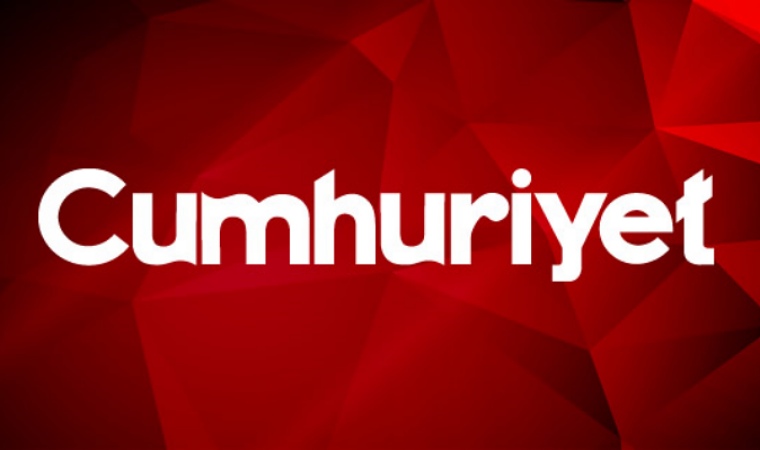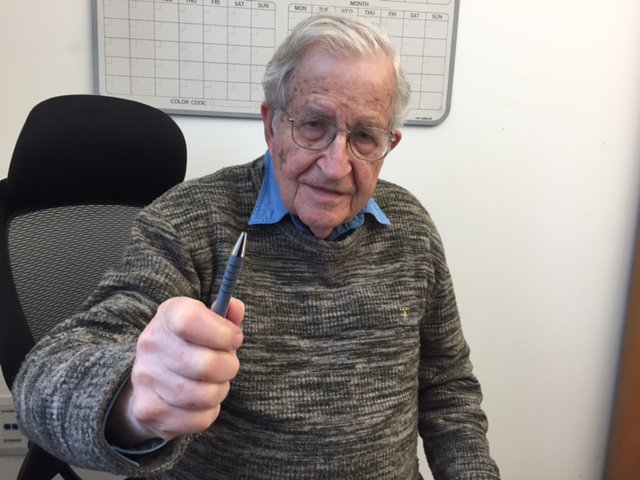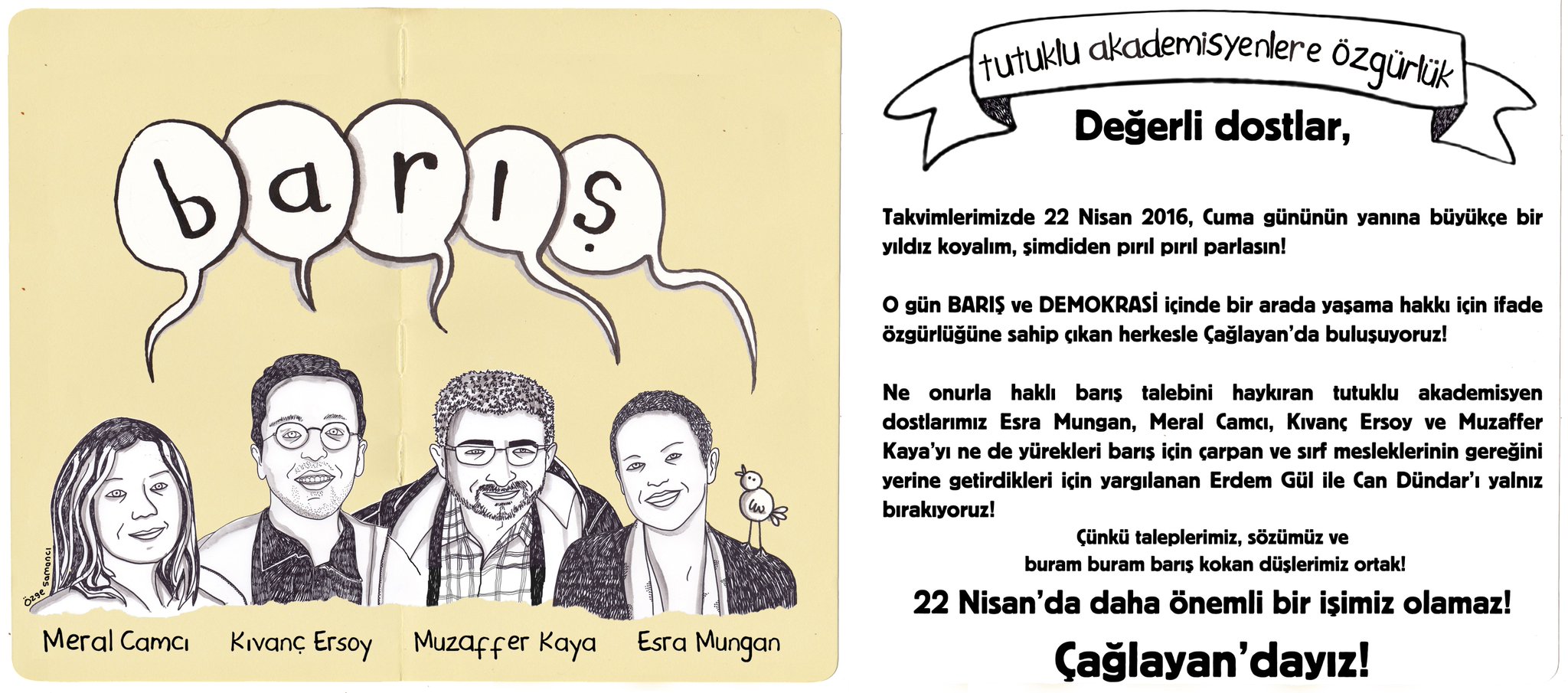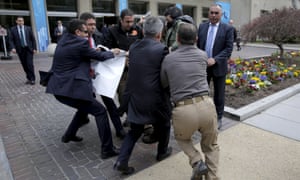The Letter to be published in the April 21, 2016 issue of the New York Review of Books:
by Kwame Anthony Appiah, Seyla Benhabib, Judith Butler, Drucilla Cornell, and Jan-Werner Müller, et al.
To the Editors:
We write to express our dismay at the deterioration of freedoms of expression, association, and personal security faced by our colleagues in Turkish universities and the media.
University professors Esra Mungan, Muzaffer Kaya, and Kıvanç Ersoy were arrested on charges of spreading “terrorist propaganda” because they signed a petition condemning the Turkish government’s security operations in cities of the southeast, owing to the disastrous impact on the Kurdish civilian population. Made public at an Istanbul news conference on January 11, the petition also called for a resumption of peace talks with the PKK.
For signing the petition, at least thirty-eight academics have been dismissed and twenty-nine suspended by their universities. An Istanbul prosecutor is investigating all academics who signed the petition. Those who have been arrested could face up to five years’ imprisonment.
While we forcefully condemn the suicide bombings of civilians that have recently plagued Turkey, we insist that it is unwise to silence any critique of the government’s dealings with its Kurdish population when the general security situation in the country is deteriorating.
Before the Gezi Park protests of 2013, the ruling AK Party had initiated a peace process with Kurds, and Turkey had an opportunity to become a more pluralist, tolerant, open, and vibrant society. As social scientists and theorists in different fields, we followed these developments closely, but now we observe the near-collapse of a constitutional multiparty democracy and the move toward authoritarian presidentialism, the emergence of government by plebiscites and decrees, the squashing of the opposition, and the silencing of civil society institutions. None of these developments is necessary. Turkey still has strong and exemplary parliamentary, judicial, scientific, and civic institutions that can navigate this period of multiple crises.
We call upon the Turkish government and judicial authorities to suspend all charges against academics who signed the petition, and we ask that individuals who have lost their academic positions be reinstated with due process.
We encourage the AK Party and its representatives to return to the spirit of uzlasma(reconciliation) with Turkey’s Kurdish citizens who are in search of an acceptable resolution to a conflict that is growing all the more dangerous because of the instability on Turkey’s borders and the Middle East region.
Valérie Amiraux, University of Montreal
Talal Asad, CUNY Graduate Center
Anthony Appiah, New York University
Albena Azmanova, University of Kent, Brussels School of International Relations
Zehra Arat, University of Connecticut
Etienne Balibar, Université de Paris-Ouest Nanterre and Kingston University London
Seyla Benhabib, Yale University
Richard Bernstein, New School for Social Research
Darin Barney, McGill University
Claudia Berger, Indiana University
Akeel Bilgrami, Columbia University
Patrick Brantlinger, Indiana University (Emeritus)
Susan Buck-Morss, CUNY Graduate Center
Judith Butler, University of California at Berkeley
Giancarlo Bosetti, Journalist, Italy
Purnima Bose, Indiana University
Wendy Brown, University of California at Berkeley
Claude Calame, Ecole des Hautes Etudes en Sciences Sociales
Robin Celikates, University of Amsterdam
Benoit Challand, New School for Social Research
Gabrielle Coleman, McGill University
Drucilla Cornell, Rutgers University
Alex Demirovic, Goethe-University, Frankfurt
Alessandro Ferrara, University of Rome, Tor Vergata
Didier Fassin, Institute for Advanced Study
Rainer Forst, Goethe-Universitaet, Frankfurt
Josef Früchtl, University of Amsterdam
Nancy Fraser, New School for Social Research
Stefan Gosepath, Freie Universitaet Berlin
Sally Haslanger, MIT
Axel Honneth, University of Frankfurt and Columbia University
Dick Howard, SUNY at Stony Brook (Emeritus)
Engin Isin, The Open University, London
Rahel Jaeggi, Humboldt University Berlin and New School for Social Research
Serhat Karakayali, Humboldt University Berlin
Volker Kaul, University of Rome
Ivan Krastev, Journalist, Sofia and Vienna
Regina Kreide, Justus Liebig University Giessen
Daniel Loick, Frankfurt and New York
Michel Lowy, CNRS Paris (Emeritus)
Oliver Marchart, University of Vienna
Rosalind C. Morris, Columbia University
Jan-Werner Müller, Princeton University
Frederick Neuhouser, Barnard College
Christian Neuhäuser, Technical University Dortmund
Peter Niessen, University of Hamburg
Kalypso Nikoalidis, Oxford University
Anne Querrien, co-editor of journal Multitudes
Bruce Robbins, Columbia University
Hartmut Rosa, Jena University
Juliane Rebentisch, Offenbach University of Art and Design
Benjamin Robinson, Indiana University
Martin Saar, Liepzig University
Guillaume Sibertin-Blanc, Toulouse University
James Sleeper, Yale University, Journalist
Céline Spector, Université Bordeaux Montaigne
Ferdinand Sutterlüty, Goethe University Frankfurt
Judith Revel, Universite de Paris Ouest Nanterre
Beate Roessler, University of Amsterdam
William Scheuerman, Indiana University
Etienne Tassin, Université Paris Diderot
Bert van den Brink, Utrecht University
Eleni Varikas, University of Paris (Emeritus)
Nguyen Vu Thuc Linh, European University Institute
Sophie Wahnich, CNRS, Paris
Michael Walzer, Institute for Advanced Study (Emeritus)
Frieder Otto Wolf, Freie Universität Berlin
























